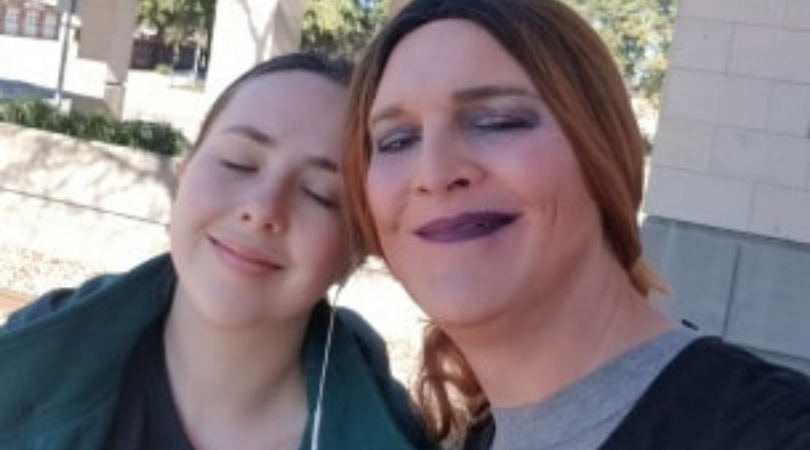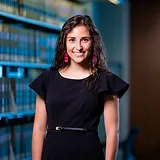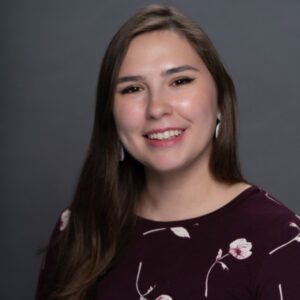
Christina Weir is a trans-feminine activist who identifies as a “Declaration of Independence progressive.” As compared to a Constitutional conservative, Christina analogizes her views to the Declaration of Independence—guaranteeing life, liberty, and the pursuit of happiness. For Christina, “life” is universal access to healthcare and “liberty” is universal access to education. Healthcare and education are Christina’s most passionate interests because of the challenges she has faced towards her ability differences, including Attention Deficit Disorder, Dyslexia, and Dysgraphia. Now, as a parent of children with ability differences, Christina advocates more than ever to ease access to healthcare and educational resources.
Christina remembers her first encounter with politics alongside her mother when Christina protested against the creation of a road. This road, if built, would cut through a nature preserve located in the back of her neighborhood. Her mother was one of the lead organizers of the protest and encouraged Christina, a then elementary student, to advocate for what she believed in. Little did Christina know that this protest would spark a journey of activism spanning beyond her childhood.
Christina was raised in the Dallas suburb of Plano, Texas. She lived in Plano until she headed to Beacon College in Florida for her undergraduate studies. Christina chose to attend Beacon College because of the programming offered for students with disabilities. Quickly after moving, Christina recognized that her views as a progressive stuck out in the conservative makeup of her hometown. She noticed that she had lived with privilege. She also started recognizing her passion for progressive policies like universal healthcare and debt-free education.
When Christina returned to Plano from college, she became invested in local politics. She started working on local campaigns as an organizer, taking on tasks as a phone banker or block walker. She also took on an active role as a fundraiser for the Susan G. Komen walk, raising thousands of dollars each year towards breast cancer research and awareness. Then, in 2008, President Barrack Obama was elected and pushed Christina into a new phase of activism for universal healthcare.
During his first term, President Obama passed the Affordable Care Act, providing health insurance to all Americans. As someone who faced back problems and learning disabilities, Christina rejoiced at the passage. Christina strongly believes that healthcare should be universal and come from taxpayer funds—similar to systems in France, Germany, or Canada. “Nobody should have to suffer and be afraid to go to the doctor,” she says. Christina lived without health insurance for fifteen years while managing chronic conditions or disabilities. Many times, Christina has gone without the help she needed, calling it a demoralizing experience. Then, the State of Texas filed a lawsuit against the ACA passage, claiming that various terms infringed on state’s rights. Christina advocated against this lawsuit by fielding candidates running for office in her local area. To Christina, she felt she could make the greatest impact on the grassroots level. She campaigned for candidates such as Beto O’Rourke, Bernie Sanders, and Cristina Tzintzun Ramirez because of their stance on universal healthcare.
In addition to healthcare, Christina is also passionate about education for all. Christina believes that everyone should have access to a high quality education that continues into studies beyond high school. “We have the brightest minds who cannot afford to go to college,” says Christina. In fact, Christina believes that the spike in healthcare costs over the past decade can be attributed to the increase in student loan debt. She says that healthcare providers such as doctors and specialists have to charge more for their services to pay back expensive loans for medical school. Christina advocates for a debt-free education as a decrease for healthcare costs.
Christina’s advocacy expands beyond changes in higher education costs—she also fights for disability rights in education. Christina personally fought for her Section 504 accommodations throughout her schooling career. As a child, she was gawked at by teachers who claimed she was too smart to have a disability or need accommodations. Now, as the parent of two daughters with disabilities, Christina is still advocating for quick and proper implementation of disability accommodations. The most difficult aspect of advocating for accommodations are teachers who oppose the requested measures. “It has been difficult,” Christina says. But she has never given up and continues to fight.
Christina advises other women and femmes fighting for something to never give up. “People are always going to tell you no,” she says, “so stand on your convictions. Don’t let anyone else sway you away from what makes you passionate.”





